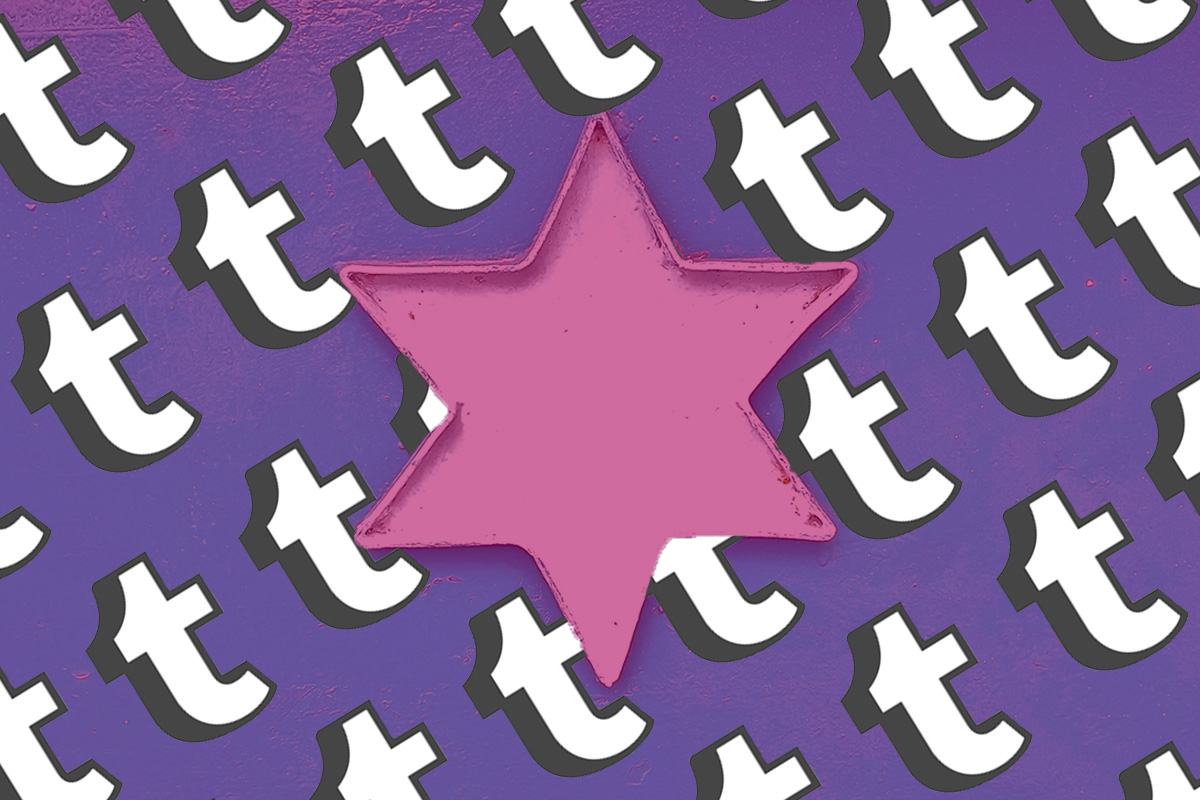When Solstice Hannan attended boot camp after enlisting in the U.S. Navy, they frequently attended services on base to connect with other Jews and engage with their heritage. However, when Hannan was later stationed in Italy, they were one of only five Jews on base.
“I didn’t have anyone to do holidays with or as many opportunities to participate in Jewish culture,” Hannan said. “I could take the day off to do services in my room, but I really needed community again.”
Hannan found the community they sought online through Jumblr, the Jewish ecosystem that exists on Tumblr, a microblogging platform that launched in 2007.
Tumblr currently hosts more than 473.9 million blogs. While some users utilize the site for personal journaling, many dedicate entire blogs to specific interests or fandoms. The subsequent communities that form frequently feature “-blr” at the end of their name. While puppy lovers connect on dogblr, Jews congregate and find each other on Jumblr, especially queer Jews who often feel left out of mainstream Jewish spaces.
And they’re doing something right: Out of hundreds of communities formed through specific tags, Jumblr was ranked #18 on the site’s official list of Top Tumblr Communities last year.
Ezra Saville, a 19-year-old college student and active Jumblr user, describes the community as a “social platform for Jews to kvetch, argue, and collect resources.” While they engaged with other communities previously, Saville learned of Jumblr when other bloggers began tagging Jewish content with #Jumblr.
“Jumblr has really led me to be able to make friends and connections, given me a space to collect resources and learn from other Jews and allowed me to develop my opinions and explore Judaism in a safer space,” Saville said. “I am an intersex, transgender/non-binary person who is currently in an interfaith relationship and have to convert for legality issues [within Jewish law] despite being raised Jewish. I also am autistic and deal with other personal issues that can create some barriers. All of this combined causes me sometimes to have a complicated relationship with Jewish spaces [in real life].”
Content on Jumblr “fills a void of accessible education” for many who have been traditionally marginalized or unable to access Judaism in traditionally offline spaces, according to Saville.
“A lot of adult education might not be available, or it is too expensive, or someone can’t access their local synagogue,” Saville said. “Many conversion students, de-assimilating Jews, and others post their learnings and resources [on Jumblr] to share.”
While plenty of informative posts circulate explaining holiday rituals or sharing nuggets of wisdom from traditional texts, Jumblr is also a dumping ground for Jewish takes on viral memes, rants on anti-Semitism, and an abundance of Jewish jokes. On any given day, one can find posts that imagine Hogwarts as a yeshiva or debate whether a Jewish vampire could keep kosher and still drink blood.
“Growing up, you had that group of kids who were only at the synagogue because they had to be, and then you had me sitting at the front of the class asking the rabbi all sorts of weird questions,” Hannan said. “I was always a hand-raiser, and Jumblr has allowed me to continue that and allowed me to engage in the mind-exercises of Judaism.”
Spider Perry, a transgender, non-binary queer Jew, describes Jumblr as a “perpetual Torah study that is just as likely to go off-topic” that has provided them a loving queer Jewish community both online and offline. A friend they met virtually through Jumblr even served as their witness at Perry’s conversion mikveh immersion.
“[Through Jumblr,] I’ve gotten access to a much wider and much queerer set of opinions than I get from my local synagogue,” Perry said. “Also, because I know we are not uncommon — that queer and trans Jewish folx are not an anomaly but a regular part of the community — it’s given me the courage to ask for my synagogue to be more actively inclusive. It has also led me to queer Jewish events in real life.”
Perry emphasized the importance of accessibility to queer Jewish spaces that Jumblr provides.
“Having realized how many trans and queer Jews there are in the world, I feel much, much less alone. And because of my experiences on Jumblr, I’ve taken my rabbi’s ‘Have you ever considered becoming a rabbi?’ much more seriously,” Perry said. “I don’t know if I would have done that if I didn’t know how many queer Jews there are out there, disconnected from synagogue life, because no one like them is in synagogue leadership near them.”
While many have found friendship and community, many bloggers have also experienced anti-Semitism, cyberbullying, and abuse on the platform. Tumblr users can anonymously send each other messages, and Nazis regularly abuse this feature to harass Jewish bloggers through hateful messages, threats of doxxing, and by sending graphic pictures of bodies of Jews murdered in the Holocaust.
Unlike other social media sites, Tumblr’s community guidelines explicitly forbid hate speech while encouraging users to report content that violates these standards. However, the site has been criticized for not adequately purging its platform of content created by Nazis, white supremacists, and other alt-right users.
Jumblr bloggers don’t only endure abuse from neo-Nazis — sometimes, Jews send anonymous asks or create fake blogs to harass other Jews.
“Anonymity is a hell of a drug,” Perry said. “I know multiple converts who have been doxxed or had their rabbis contacted to try to stop them from converting.
“Jumblr takes some of the worst parts of the Jewish community and amplifies them just the same as it amplifies the best parts of the Jewish community,” Perry continued. “Despite all of the negative aspects of Jumblr, and there are several, I wouldn’t trade it for anything.”
Image via Joe Pregadio/Unsplash



